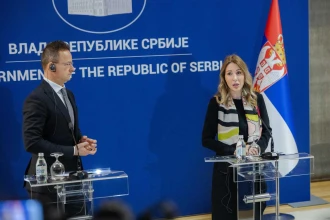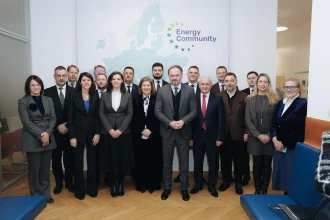At the first session of the Strategic Council for Cooperation between Serbia and Hungary, Minister of Mining and Energy, Dubravka Djedović signed a Memorandum of Understanding on the Construction of the Hungary-Serbia Oil Pipeline with the Minister of Foreign Affairs and Foreign Trade of Hungary, Péter Szijjártó.
Memorandum of Understanding on the Construction of the Hungary-Serbia Oil Pipeline Signed
"Serbia currently has only a single route of crude oil supply, through Croatia, and in order to increase the level of security it is necessary, as in the gas sector, to have diversification of supply sources and routes. By constructing a new oil pipeline to Hungary, we will ensure a more secure supply of the domestic refinery, and thus of the domestic market. This project is planned in the list of priority investments as one of the strategic projects in the area of oil supply," Djedović said.
She pointed out that Hungary and Serbia, being two countries that have friendly relations, have reaffirmed their solid and reliable energy partnership amidst the energy crisis. "Hungary is supplied with gas from the Balkan Stream via Serbia, and Serbia stores part of its gas reserves in Hungary. By constructing a new oil pipeline, we will further expand our strategic relations in the energy sector, and Serbia will raise its energy security to a higher level," said Djedović.
The estimated value of the Serbia-Hungary oil pipeline construction project for a capacity of 5.5 million tons per year is EUR 157 million for the Serbian section of the oil pipeline. According to the plan, the new oil pipeline will run along the route of Szazalombata-Algyo-Roske-Novi Sad, with a total length of 304 kilometers, with a potential extension to Thessaloniki and Durrës.
The MoU stipulates that before the start of the implementation of the project, the companies Transnafta AD and the MOL Group will sign, as project developers, an Agreement on the Construction of the Hungary - Republic of Serbia Oil Pipeline which will more specifically define the technical and technological characteristics and the time frame of the implementation, as well as the mutual and individual obligations of the participants in the project.
Also, CEO of PE Srbijagas Dušan Bajatović and CEO of MVM CEEnergy Zrt Laszlo Zoltan Fritsch signed an agreement to establish a joint venture between Srbijagas and the Hungarian power utility MVM.



.webp)







